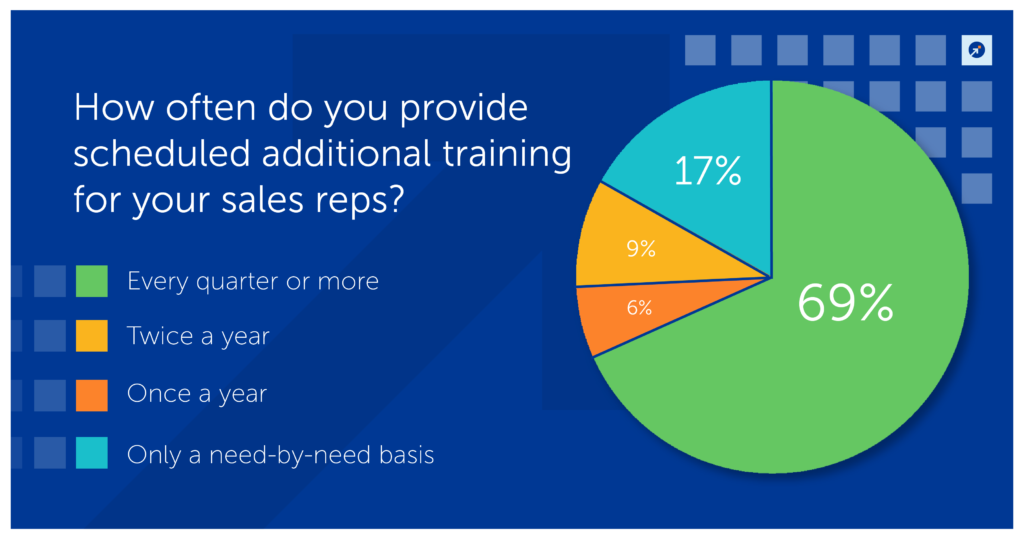Last quarter, I talked about how pipeline is a team sport. Today, I want to focus on how we can help our sales team succeed. Sales reps are on the front lines every day, talking to leads and moving deals forward.
To reuse part of the team sports metaphor, your sales reps are like running backs. Marketing hands-off the ball and they have to be prepared to run it, catch it, or go all the way for the touchdown. They have to make quick decisions while handling high numbers of conversations each day.
There is a bad habit of judging sales reps based only on their personal performance. Unlike in other departments, we have direct sales numbers for each rep. So, if we see bad numbers, the knee-jerk reaction is to blame the individuals on the sales team.
While there will always be MVPs and most improved players, before you consider readjusting your personnel, you need to look at what you are doing as the coach to give your team the fighting chance to succeed. Like for the superbowl teams this weekend, you have to properly train and prepare to win.
Why We All Need a Sales Training Plan
A running back doesn’t hop out of bed the day of a game, wander down to the field, and hope they get the ball at some point. They have trained, planned, and practiced with their team. They know their plays and routes.
Likewise, your sales team shouldn’t just be familiar with your pitch, product details, and competitor talking points. They should have spent time practicing so they could recall the information easily.
Sharing informational resources with sales isn’t enough. You need to have time where they review the data, discuss techniques that have been working, and have dedicated time to self-improvement. Not to mention the commitment from leadership to ensure they allocate time and their attention towards training
If all you do is share a big Google Drive folder of resources, sales reps will have to take time away from hitting quota to self-train. There are always a few people who will be fine with that approach, but everyone will do better with dedicated training time.
Without sales training, your team is going to definitely struggle and is most likely to fail. A football team that never practices will always get stomped. Doesn’t matter if they’re fantastic players. They need practice.
Once you have a training plan implemented and working, you can get an honest appraisal of each sales rep’s skills. If a rep has completed training and is underperforming while the majority are succeeding, then you have a personnel issue. But you can’t know until you’ve provided a chance for everyone to shine.
Taking a Proactive Training Mindset
One of the bigger mistakes in sales training is being reactive instead of proactive. Your team skips extra training and focuses on selling all quarter, but when the final numbers aren’t what you had hoped for, the team needs a whole review process to find issues.
Instead, by having frequent training sessions throughout the year, you can focus your team on best practices and avoid mistakes ahead of time. No more missing quota before learning a lesson.
I asked on my LinkedIn network how often everyone has additional sales training. Let’s look at the results.

I’m happy to see that over ⅔ of you have already made quarterly training part of your process! But I’m a little concerned about the other teams.
Our team has a sales kick-off event every quarter to share best practices, review techniques, and learn about new product updates. But, I’ll admit my poll question was a bit of a trick question. Ideally, your reps should be receiving coaching and training every week.
Like many of you, we have software (ExecVision) to record and monitor our sales conversations. Make use of them! Just remember your goal is to help your reps grow. You’re not trying to catch and punish them for mistakes. Take time to compliment what they do well, along with your critique.
Training is an ongoing process.
Help Sales Take the Long View
However, there is one item that is best handled during the quarterly sales training sessions: the big-picture strategy.
Your reps easily get caught up in the daily minutia, goals, and conversations. Use your sales training events to help them understand why their quotas have been set where they are, the company’s goals for the next year, and the sales philosophy you would like to encourage.
Every company will have its approach, but this year I think it’s important to stick to your key base of customers and provide the best service possible. The economy is still working through the impact of COVID, and everyone is being cautious. Focus on finding your long-term customers instead of chasing big fish.
As companies decide which services to keep or purchase, the biggest impact is going to be the relationship between yourself and the customer. If you have a strong relationship, then everything else is just technical details to work out as needed.
Frequently, we think of excellent customer service not starting until someone is a customer. But, I think it starts the second anyone from your company comes into contact with a prospect. Take your time to be considerate, listen, and be as helpful as possible when selling.
In football, if you were to throw a long pass each play and catch it every time, you’d rocket up the scoreboard. But no one always catches the ball, and the more risky and fast the play, the worse your chances of success.
While everyone is still in a cautious business environment, be deliberate. Focus on forward progress. Better to move 5 yards every play and take longer to score than fumbling when trying to move too fast.
Whatever your approach, best of luck to you and your team this year. Happy selling and happy training!




